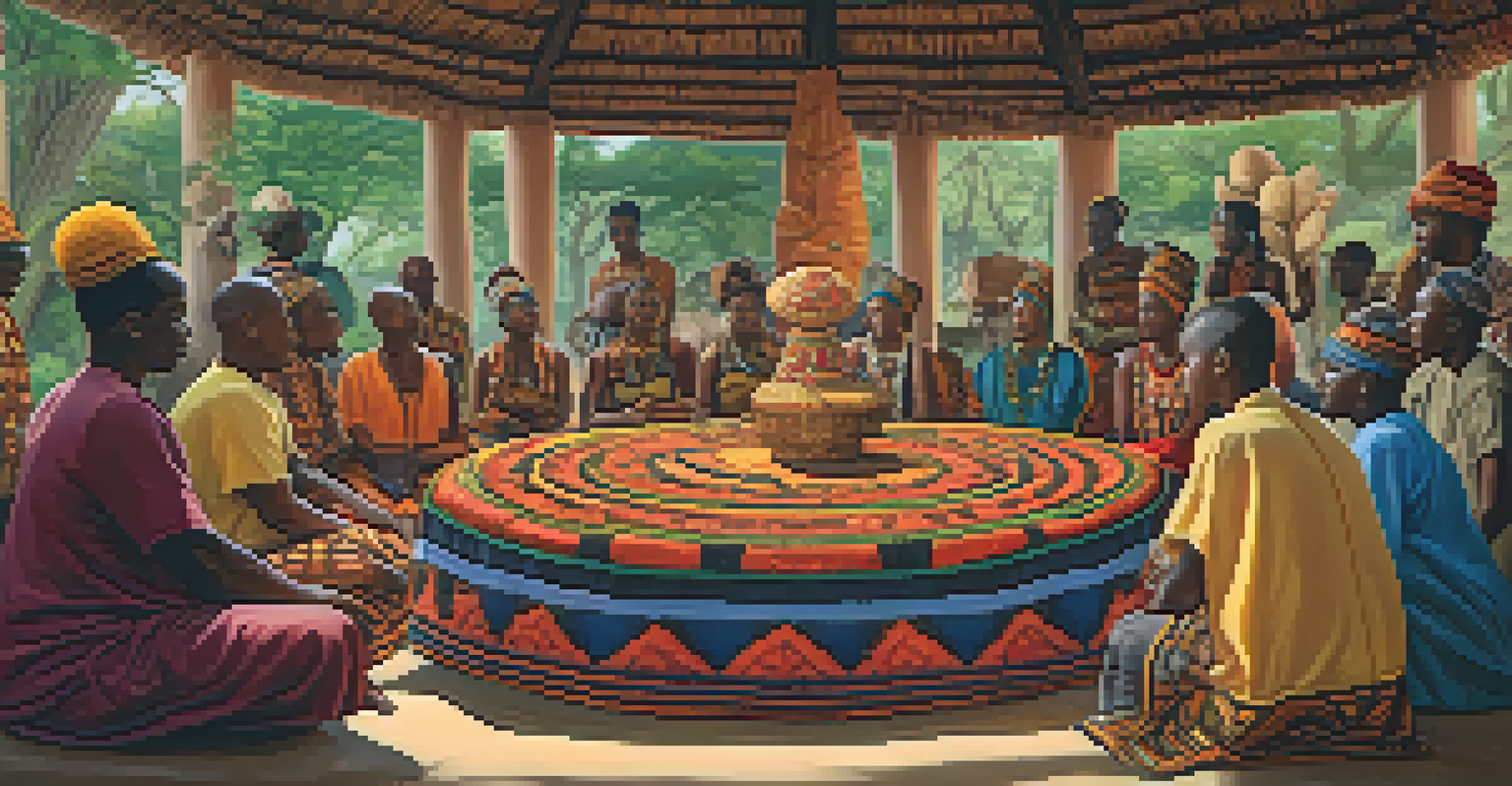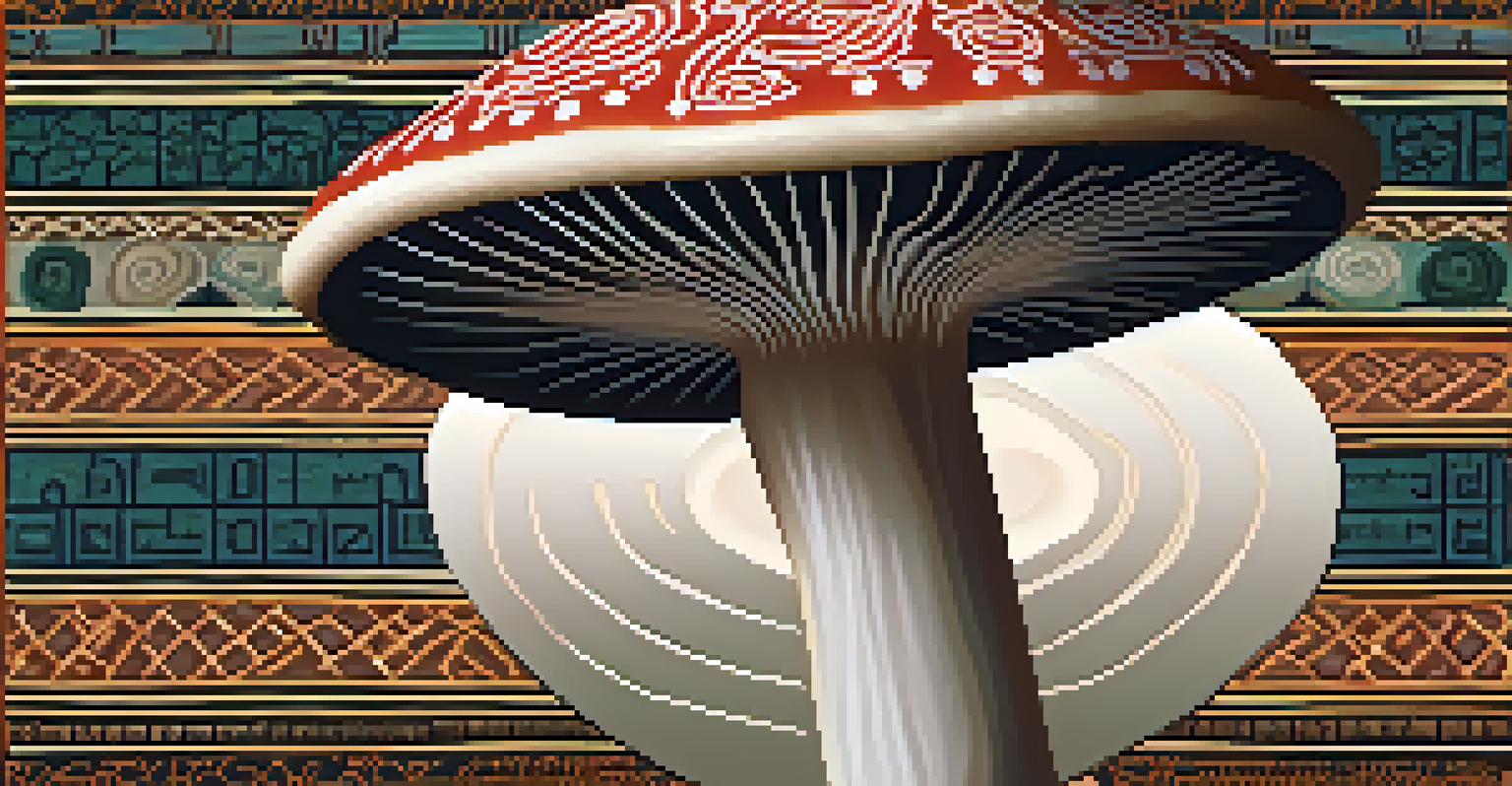The Influence of Mushrooms in African Traditional Religions

Introduction to Mushrooms in African Spirituality
Mushrooms have held a significant place in various African traditional religions, often symbolizing a connection to the spiritual realm. These fungi are seen not just as physical entities but as gateways to divine experiences. In many cultures, they are revered for their mystical properties and their ability to facilitate communication with ancestors and spirits.
Nature does not hurry, yet everything is accomplished.
The significance of mushrooms is deeply rooted in African cosmology, where they are often associated with fertility, healing, and transformation. Many communities incorporate mushrooms into rituals and ceremonies, believing that they enhance spiritual awareness and insight. This belief illustrates the intricate relationship between nature and spirituality in African cultures.
Moreover, mushrooms are sometimes used in traditional healing practices, where they are thought to possess medicinal qualities. This blend of spirituality and healing underscores the holistic approach of African traditional religions, reflecting a deep respect for nature's gifts.
Cultural Significance of Mushrooms
In various African communities, specific types of mushrooms are highly valued and can even be considered sacred. For instance, certain mushrooms are used during rites of passage, symbolizing the transition from one life stage to another. These rituals often include communal gatherings, where stories and teachings about the mushrooms' significance are shared.

Additionally, mushrooms are sometimes featured in folklore and mythology, serving as symbols of resilience and the interconnectedness of life. They are often depicted in stories that emphasize balance and harmony within nature, reflecting the values of many African societies. This cultural significance helps to preserve traditional knowledge and practices across generations.
Mushrooms as Spiritual Gateways
Mushrooms are viewed in African spirituality as powerful connections to the divine, facilitating communication with ancestors and enhancing spiritual awareness.
As a result, mushrooms not only contribute to the spiritual landscape but also play a crucial role in preserving cultural identity. They are a reminder of the rich tapestry of beliefs and practices that define African traditional religions.
Mushrooms and Healing Practices
Healing practices in African traditional religions often incorporate mushrooms, believed to possess potent medicinal properties. For example, some mushrooms are thought to enhance mental clarity and emotional well-being, making them integral to rituals aimed at healing both physical and spiritual ailments. This connection to health demonstrates the holistic nature of African spirituality.
The earth has music for those who listen.
Traditional healers, or sangomas, frequently utilize mushrooms in their treatments, combining them with other herbs and rituals to create powerful remedies. The use of mushrooms in healing is not only about physical health but also about restoring balance and harmony in a person's life. This reflects a broader understanding of health that encompasses the mind, body, and spirit.
Moreover, the act of foraging for mushrooms can itself be a spiritual journey. Healers often seek guidance from ancestors or spirits before embarking on these quests, emphasizing the deep connection between nature and the spiritual world in African traditions.
Mushrooms in Rites and Ceremonies
Rites of passage and other ceremonies frequently feature mushrooms, underscoring their importance in marking significant life events. For instance, they may be offered to ancestors as part of a ritual, symbolizing respect and a desire for guidance. These practices highlight the belief that mushrooms can bridge the gap between the physical and spiritual worlds.
During communal ceremonies, mushrooms may be consumed to induce altered states of consciousness, allowing participants to connect more deeply with their spiritual beliefs. This use is often approached with reverence, as it is seen as a sacred opportunity to commune with the divine. Such practices reinforce the idea that mushrooms are not merely food but are imbued with spiritual significance.
Cultural Identity and Healing
Mushrooms play a crucial role in African cultural practices, symbolizing transformation and being integral to traditional healing methods that promote holistic well-being.
Through these rituals, communities cultivate a shared sense of identity and purpose, illustrating how mushrooms play a vital role in the social fabric of African societies. They help to forge connections among community members while also strengthening their ties to their ancestors.
Symbolism of Mushrooms in African Lore
In African folklore, mushrooms often symbolize rebirth and renewal. Their ability to sprout seemingly overnight from the ground aligns with themes of transformation and the cyclical nature of life. This symbolism resonates deeply within cultures that place high value on growth, change, and the continuum of existence.
Furthermore, mushrooms can represent hidden knowledge and the mysteries of the universe. Their often obscure growth patterns can be likened to the secrets of life that are only revealed to those who seek them. This metaphor serves to inspire individuals within the community to pursue wisdom and understanding.
The rich tapestry of stories surrounding mushrooms contributes to a broader narrative about the relationship between humanity and nature. By embodying both the seen and unseen aspects of existence, mushrooms remind us of the layers of meaning that can be found in the natural world.
Modern Perspectives on Mushrooms in Tradition
As African societies evolve, so too does the understanding and integration of mushrooms within traditional religions. Modern interpretations often seek to blend ancient practices with contemporary knowledge about mushrooms, including their nutritional and medicinal benefits. This fusion creates new avenues for cultural expression and spiritual exploration.
Younger generations, in particular, are increasingly interested in reconnecting with their roots and exploring traditional practices. This resurgence can lead to a renewed appreciation for the role of mushrooms, not just as spiritual symbols but also as vital components of health and community life. Workshops and educational sessions about the benefits of mushrooms are now being organized in various communities.
Modern Revitalization of Traditions
Younger generations are increasingly interested in integrating traditional practices involving mushrooms with modern knowledge, fostering cultural expression and environmental conservation.
Moreover, this modern perspective can foster a deeper respect for environmental conservation. As communities recognize the importance of mushrooms in their cultural heritage, they may also become more proactive in preserving the ecosystems that sustain these fungi.
Conclusion: The Enduring Legacy of Mushrooms
The influence of mushrooms in African traditional religions is profound and multifaceted, encompassing spirituality, healing, and cultural identity. As symbols of connection to the divine, they remind us of the intricate web of life that binds us all. Their role in rituals and ceremonies illustrates how nature is deeply woven into the fabric of human experience.
In a rapidly changing world, the enduring legacy of mushrooms offers valuable lessons about respect for nature, the power of community, and the importance of tradition. By understanding and embracing these teachings, we can foster a greater appreciation for the natural world and its role in our lives.

Ultimately, mushrooms serve as a testament to the richness of African spiritual practices and the ongoing relevance of nature in our quest for meaning and connection. Their influence will likely continue to inspire future generations in both spiritual and practical realms.